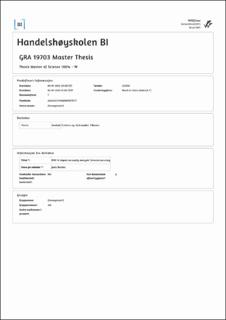| dc.contributor.author | Nakken, Joakim | |
| dc.contributor.author | Vikenes, Aleksander | |
| dc.date.accessioned | 2023-10-17T11:35:13Z | |
| dc.date.available | 2023-10-17T11:35:13Z | |
| dc.date.issued | 2023 | |
| dc.identifier.uri | https://hdl.handle.net/11250/3097000 | |
| dc.description | Masteroppgave(MSc) in Master of Science in Business, Finance - Handelshøyskolen BI, 2023 | en_US |
| dc.description.abstract | This study analyzes the impact that IFRS 16 has had on the accuracy of equity
analysts’ forecasts in Scandinavia, with a particular focus on potential sector
variations. The primary objectives of this research are (1) to examine whether
the mandatory implementation of IFRS 16 led to decreased accuracy in equity
analysts’ forecasts, and (2) to assess whether changes in accuracy vary by
sector.
We employed multivariate regressions to test for statistical significance in
changes in forecast accuracy measured by the Median Absolute Forecast Error
(MAPE). Additionally, a survey was conducted involving equity analysts from
a variety of investment banks in Oslo to supplement the quantitative data.
We found no statistical evidence to support the hypothesis that the
implementation of IFRS 16 led to an increase in forecast errors. This
suggests that either the forecast accuracy did not change significantly postimplementation
or that the time frame since implementation has been
insufficient to observe its full effects. While the immediate impact of IFRS
16 on forecast accuracy was not evident, this study serves as a foundation for
further research on the topic | en_US |
| dc.language.iso | eng | en_US |
| dc.publisher | Handelshøyskolen BI | en_US |
| dc.subject | finans | en_US |
| dc.subject | finance | en_US |
| dc.title | The Comprehensive Risk Control Package: Its effect on performance during the COVID- 19 pandemic | en_US |
| dc.type | Master thesis | en_US |
